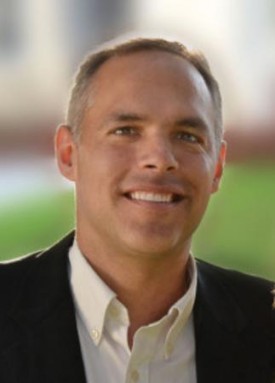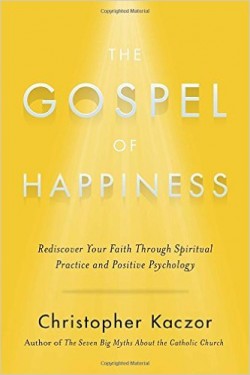 It started as the happiest day of Christopher Kaczor’s life. His wife was in the hospital, ready to give birth to their first child. The doctor had a fetal heart monitor hooked up so they could monitor the baby in the womb, and everything was going well. Suddenly, the baby’s heart rate started dropping and dropping and dropping.
It started as the happiest day of Christopher Kaczor’s life. His wife was in the hospital, ready to give birth to their first child. The doctor had a fetal heart monitor hooked up so they could monitor the baby in the womb, and everything was going well. Suddenly, the baby’s heart rate started dropping and dropping and dropping.
The monitor’s alarm went off and medical staff rushed into the room. Kaczor recalls being horrified. “My baby’s going to die and my wife’s going to die,” he thought.
Doctors immediately moved his wife into the operating room for an emergency C-section and the surgeon had the knife in his hand when the baby’s heart started beating normally again as if everything was alright. And it was. Ten minutes later, the Kaczors’ daughter Elizabeth was born healthy.
During an interview on “Christopher Closeup,” Kaczor said, “It was going from absolute horror to absolute joy in a very short period of time. I’d have to say that still is probably the high point of my whole life, where I felt the most intense kind of joy, because I had the most intense kind of fear immediately before it.”
The ideals of joy and happiness have intrigued Kaczor ever since he was a college student, but especially since he endured some challenging times that left him feeling depressed. He decided to research how he could become happier and discovered a field called Positive Psychology: “It looks to establish what increases optimism and hopefulness and flourishing by using empirical means. And what I discovered was that many of the practices they found that increase happiness – things like gratitude and forgiveness and serving your neighbor – are core parts of Christian spiritual tradition.”
Kaczor explores the intersection of those two areas in his book “The Gospel of Happiness: Rediscover Your Faith Through Spiritual Practice and Positive Psychology.” He uses the acronym PERMA to define the five elements of happiness: “P stands for Positive Emotion. E is Engagement, a sense where you’re so engaged in whatever activity you’re doing that time seems to stop. The R of PERMA is relationships. So part of happiness is having loving relationships with friends, with family, with God. M stands for meaning, and meaning is making a contribution to something larger than yourself, making life better for your friends, for your family, for your workplace, for your community, for your school, for your church. Finally, A is for achievement and accomplishing goals that we set.”
One of the interesting things that Kaczor discovered in his research is that “The happiness quotient is higher among people who practice religious faith, not just have religious faith.” In other words, the many Americans who actually go to religious services every week are more likely to be happy.
As a practicing Catholic, Kaczor relates this to his own experience of going to Mass. For instance, he notes that all the congregants say the “Our Father” together, which includes the words, “Forgive us our trespasses as we forgive those who trespass against us.” That’s a reminder that we need to practice forgiveness both as a calling of our faith and because it will lead to a happier life.
In addition, said Kaczor, “The very last words of the Mass are ‘Thanks be to God.’ Every Mass is a chance to offer thanksgiving. And one of the interesting things I learned in my book is that the fewest number of people commit suicide on Thanksgiving Day, and that’s quite significant. Because on Thanksgiving Day, people turn their minds and hearts to what they have and what they’re grateful for, rather than just focusing on what they don’t have. So we as Catholics are fortunate because we have Thanksgiving Day not just once a year in November, but every single Mass is a chance to offer thanks because the Eucharist is a Greek term for ‘thanksgiving,’ and every Mass is a chance to offer thanksgiving.”
 Kaczor’s outlook has not only led him to practice gratitude, but also to see the good in others and focus on that. In “The Gospel of Happiness,” he even mentions finding the good in “Star Wars” villain Darth Vader. Since that movie has betting a tiny bit of publicity lately, I asked him to elaborate.
Kaczor’s outlook has not only led him to practice gratitude, but also to see the good in others and focus on that. In “The Gospel of Happiness,” he even mentions finding the good in “Star Wars” villain Darth Vader. Since that movie has betting a tiny bit of publicity lately, I asked him to elaborate.
He said, “If the Christian view is correct, there is good in every single person on planet Earth. And if Darth Vader were on Earth and not a fictional character, there actually would be good in him. You could say he is good with the light saber, he’s powerful, he’s able to organize the Death Star very effectively. He’s obedient to the Emperor, for the most part at least. And most of all, there is the potential for Vader to repent, to be good and change his life around, which we saw in one of the movies. So everyone has at least these good things: namely, that they’re made in God’s image, that they’re called by God to have perfect happiness with God in heaven, that they’re called to love God and love neighbor here on Earth. And as long as they’re alive, every single human person has the potential for a change of heart, for a conversion, returning to God. So that’s why we should love everybody, even those people that we perceive as the Darth Vaders in our lives.”
(To listen to my full interview with Dr. Christopher Kaczor, click on the podcast link):












